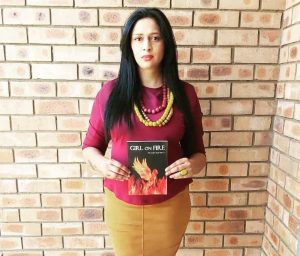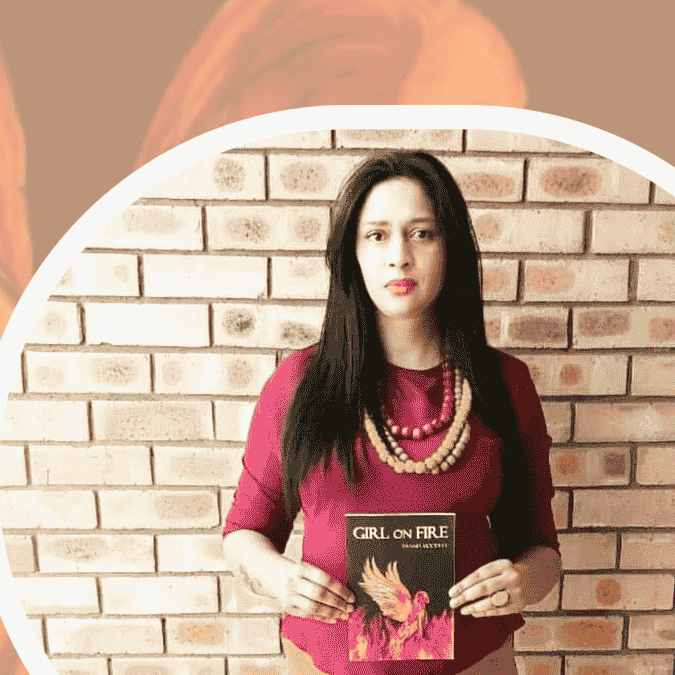CATEGORIES
People We Admire | Well-Being | Women EmpowermentGirl Power Talk Interviews Tivania Moodley, the author of ‘Girl on Fire’.
1. Your book tells the tale of all the hardships you have faced in life. What made you choose the title “Girl on Fire” for it?
Tivania Moodley: The Greek mythology of a Phoenix rising from the ashes always resonated with me. I felt for many years that I ‘died’ in the flames and rose again, brighter than before. When I did a workshop seven years ago, the facilitators chose a song for me to commemorate my ‘rebirth’ after a failed suicide attempt (without knowing my fascination with a Phoenix). They chose the song ‘Girl on Fire’ by Alicia Keys. And it was the most profound moment of absolute serendipity. There was no other title I could possibly use for my book other than that.

2. A lot of people turn to quotes as their source of encouragement in life. Do you have a favourite quote that keeps you motivated when the going gets tough?
Tivania Moodley: One of my favourites is the poem ‘Our Deepest Fear’ by Marianne Williamson, often cited by Nelson Mandela. It speaks about how we are so afraid of our light, but how it’s essential to own it, in order to give other people permission to do the same. It helps me remember who I truly am and aligns me with my purpose.
3. It takes a lot of courage to speak out about personal experiences like rape, depression and suicide. What message do you want to give to those who continue to suffer silently?
Tivania Moodley: The most important takeaway that I would hope people receive from hearing my story, is the freedom and peace that comes with owning, speaking, and living our own subjective truths. It serves no one to hide under a bushel of shame because we become as sick as our secrets.
4. How would you describe your experience at the SOAR institute?
Tivania Moodley: The SOAR Institute literally saved my life. I am alive today because of the love and kindness that was afforded me. In one weekend, my life changed so dramatically and everything that I am today is because two men and a group of angels saw me. They allowed me to accept who I am and gave me my voice.

5. Despite popular media coverage, there is still a lot of stigma surrounding the word “depression”. What do you have to say about that, and how can we, as a society, make it better?
Tivania Moodley: There is still definitely a stigma around mental health, especially in men, and the connotation that comes with depression being something you can snap out of. That is both ignorant and dangerous because people are literally choosing death as opposed to speaking out. We need to become less judgmental, more kind, tolerant, and compassionate to each other, giving people a safe space to speak their truth. In men, we need to definitely redefine what masculinity means in this day and age, and see if our masculinity ideals serve us right now or contribute to the problem.
6. If you could go back to being a teenager, what is the one thing you’d do differently?
Tivania Moodley: I used to always wish that I could go back and erase certain things, but I actually believe that every single thing that happened to me, shaped me and propelled me to become this woman. This means that none of it was wrong, none of it was bad, even the really horrible things – all of it served me. The ONLY lesson I would start earlier, is learning how to love myself.
7. How did it feel to achieve your lifelong dream of becoming a published author?
Tivania Moodley: Three years later, it still feels surreal. I am really proud of myself and it’s still such a big deal to me. It’s the literal manifestation of what it feels like to have a dream come true. And it represents my own inherent power, which serves as a constant reminder on the hard days.

8. Who would you describe as your biggest inspiration in life?
Tivania Moodley: I have many, but Oprah Winfrey is at the top. She is a testament to what we are all capable of achieving, regardless of how we were raised or what our life experiences have been.
9. What helped you muster up the mental strength on the road to self-acceptance and shatter society’s stereotypical expectations to speak out about your experiences?
Tivania Moodley: Almost dying gave me a newfound appreciation for the impermanence of life and the preciousness of time. Now, I refuse to waste a moment of it worried about how I am perceived. My life is not a democracy. I am the creator of my reality. So I am not interested in conforming or pleasing anyone anymore, other than myself.


